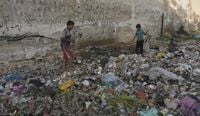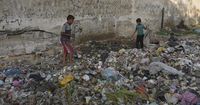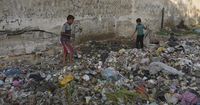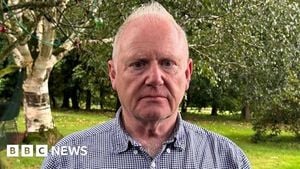British officials have announced a sweeping humanitarian initiative aimed at evacuating critically sick and injured children from Gaza to receive specialist treatment in United Kingdom hospitals, with the first patients expected to arrive in the coming weeks. The move, revealed on Monday, September 1, 2025, by Foreign Secretary David Lammy, comes as Gaza’s largest city faces a devastating famine and escalating humanitarian crisis, according to multiple reports from the Associated Press and Devdiscourse.
In a statement to Parliament, Lammy voiced deep frustration at Israel for not allowing enough aid to enter Gaza. “This is not a natural disaster, it’s a manmade famine in the 21st century,” he declared, according to the AP. He added, “I’m outraged by the Israeli government’s refusal to allow in sufficient aid.” Lammy did not mince words as he called for urgent action, stating, “We all know there is only one way out — an immediate ceasefire.”
The British government has pledged an additional 15 million pounds—roughly 20 million U.S. dollars—for medical assistance to Gaza and the surrounding region. This funding, as reported by Devdiscourse and the AP, is intended to bolster ongoing humanitarian efforts, including those supporting field hospitals in Gaza and medical evacuations coordinated with the World Health Organization (WHO) in Egypt.
Lammy emphasized the need for a “massive humanitarian response” to prevent further loss of life and starvation among Palestinians. His remarks followed a late August warning from the world’s leading authority on food crises, which reported that Gaza’s largest city was already in the grip of famine—an assessment echoed by several humanitarian organizations.
While the exact number of children and scholars Britain is prepared to accept from Gaza remains undisclosed, Home Secretary Yvette Cooper addressed Parliament on the same day, confirming that officials are expediting visas for these vulnerable groups. “Officials are expediting visas for those Palestinians, as well as their accompanying family members,” Cooper explained, according to AP coverage.
British media reports, cited by the AP, indicate that officials are facilitating the evacuation of nine students in Gaza who were awarded Chevening scholarships, a prestigious program funded by Britain’s Foreign Office. However, dozens of other Palestinian students who have received offers to study in the U.K. remain in a state of uncertainty, with their futures hanging in the balance as the situation in Gaza grows ever more precarious.
“The situation is sensitive and complex,” British officials noted, declining to provide specifics on the evacuation process due to security concerns and the rapidly evolving conditions on the ground. Nonetheless, the commitment to both sick children and aspiring scholars signals a broadening of the U.K.’s humanitarian priorities in response to the crisis.
Britain’s efforts are not isolated. Other European nations, including Italy, have also moved to evacuate students and sick children from Gaza, reflecting a growing consensus among Western governments that urgent intervention is needed. The U.K., for its part, has been funding field hospital operations in Gaza through charitable organizations and has worked closely with the WHO in Egypt to help treat some of the estimated 8,000 people from Gaza who have been medically evacuated there.
Lammy’s comments in Parliament underscored the scale of the tragedy unfolding in Gaza. He pointed to the findings of the world’s leading authority on food crises, which, in late August, reported that famine had taken hold in Gaza’s largest city. The report painted a dire picture: food supplies have dwindled to critical levels, malnutrition is rampant, and essential medical resources are stretched impossibly thin.
Against this backdrop, Lammy’s call for a ceasefire was unequivocal. “There is only one way out — an immediate ceasefire,” he repeated, reflecting a sense of urgency that has resonated throughout the international community. The foreign secretary’s remarks also highlighted the broader geopolitical tensions at play, as Western governments seek to balance humanitarian imperatives with the complex realities of the ongoing conflict.
In Parliament, Lammy also reiterated the government’s support for Palestinian students from Gaza who have been granted scholarships at U.K. universities. These students, many of whom have faced extraordinary hardship and danger, are now being given the chance to begin their studies in the fall of 2025. The Home Office, led by Yvette Cooper, has been tasked with ensuring that visa applications for these students and their families are processed as swiftly as possible.
Yet, for many, the wait continues. While nine Chevening scholars are reportedly being evacuated, dozens more Palestinian students with offers to study in the U.K. remain in limbo. The British government has acknowledged the challenges involved, citing the “sensitive and complex” nature of the operation. Security concerns, logistical hurdles, and the unpredictable situation on the ground all contribute to the difficulties faced by officials attempting to carry out these evacuations.
The U.K.’s humanitarian response is multifaceted. In addition to evacuating children and supporting students, British aid is funding field hospitals in Gaza and supporting medical evacuations in coordination with the WHO. These efforts are part of a broader strategy to address the immediate medical needs of Gaza’s population while also investing in longer-term recovery and resilience.
Other European countries have joined Britain in providing assistance. Italy, for example, has also evacuated students and sick children from Gaza, demonstrating a shared commitment among European nations to respond to the crisis. The collaboration between governments and international organizations underscores the scale and complexity of the humanitarian challenge.
As the first group of sick and injured children prepares to leave Gaza for specialist treatment in the U.K., there is a glimmer of hope amid the darkness. For the students granted scholarships, the prospect of starting a new chapter in their lives offers a rare opportunity for normalcy and growth, even as their home remains mired in conflict and deprivation.
The British government’s actions reflect both compassion and pragmatism. By providing medical care to the most vulnerable and supporting the education of Gaza’s youth, the U.K. is making a tangible contribution to alleviating suffering and fostering hope for the future. The situation remains fluid, and much work lies ahead, but for the children and students of Gaza, the promise of safety and opportunity in Britain is a lifeline worth fighting for.






